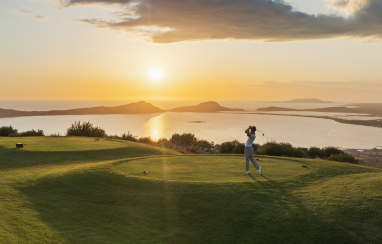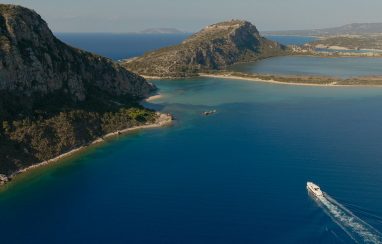By Paulina Björk Kapsalis
In the center of a white plate, a tiny mythical forest grows. Nikos Billis’ food looks good enough to photograph and present as an art piece in your home. Still, he says, “taste is what’s most important.”
He’s spent most of his life in kitchens, from helping out a friend’s family in their bakery as a young teen because he loved the smell of fresh bread, to honing his craft at top European restaurants like Noma, Miramar, De Librije and Botrinis, to the kitchens of W Costa Navarino, where he’s just taken on the Executive Chef position.
Despite his Michelin-starred background, he remains refreshingly modest. Awards are not what drives him; “I often say that when I’m cooking, I’m the happiest person in the world. The simple act of taking a few ingredients from nature and creating a dish, a flavor, an experience – or perhaps evoking a memory for the person tasting it – is magical.”
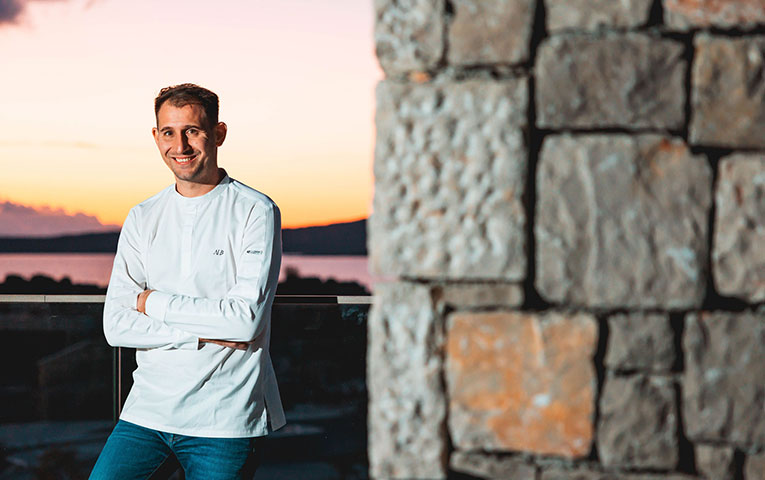
You began your career working in hotel kitchens before moving on to more, perhaps, creative pastures. Does taking on the Executive Chef role at W Costa Navarino feel a bit like coming full circle?
When I started cooking 23 summers ago, Greece’s culinary landscape was entirely different. There weren’t many great restaurants – only two, Varoulko and Spondi, had earned their Michelin stars that year. To learn, we were encouraged to seek jobs at hotels, so I took my first position at a large hotel on Rhodes. I learned a lot.
Through the years and my travels, I’ve had the privilege of working at many excellent restaurants, but I never lost my connection to hotels. Working in a hotel kitchen taught me to be well-rounded, to handle bigger budgets, and manage larger teams.
Is there a lesson to be learned in every kitchen?
Yes, but mostly, it’s about working with the right people. The best mentors don’t just teach you the right techniques – they help shape your character.
Perhaps the most famous restaurant you’ve worked at was Noma, in Copenhagen. What made you seek out a position there?
Ah, yes. That was back in ‘07-‘08. At the time, I was looking for stage positions at good restaurants where I could sharpen my skills, and while Noma wasn’t yet the global phenomenon it would later become, in our circles, it was already the most talked-about restaurant. I was intrigued by their focus on nature. Back then, no one talked about ingredients the way we do now – chefs were all about showcasing their techniques, not the farmers who provided their produce.
When I got there, I was amazed – not by the cooking, not by any recipes, but by how everything around it worked. Local small producers would come to the restaurant with wild strawberries, greens, herbs, berries, and seafood like crawfish and scallops. It was the beginning of the New Nordic movement and a major turning point in the culinary world.
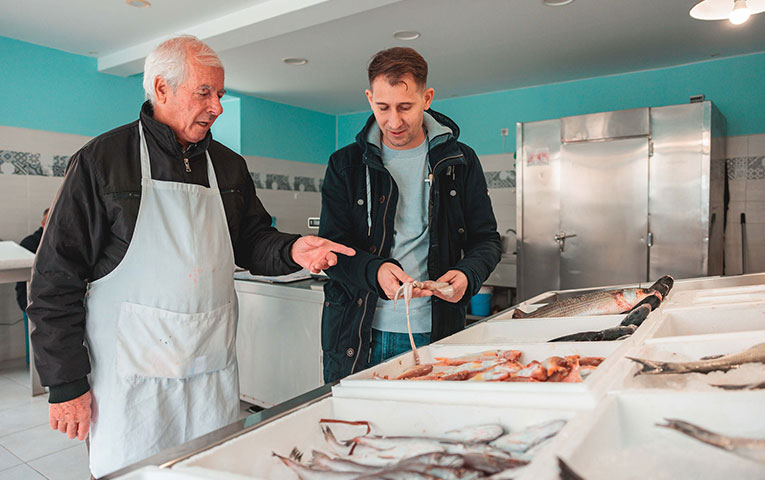
Is it possible to follow their example in Greece, and forage for ingredients?
Sure, it is! Even Athens is full of bitter orange trees, which are just about to bloom. Their blossoms can be turned into “spoon sweets.” Meanwhile, in the countryside, we’re spoilt for choice. Step just 500 meters beyond the gates of W Costa Navarino right now, and you’ll find enough ingredients to cook lunch – wild asparagus and fennel, mustard plant, and wood sorrel. It’s a blessed place.
Are you a city person or a wilderness person?
Both. I grew up in a rural area but have spent most of my life in Athens. That said, I try to spend as much time in nature as possible. Just yesterday, I was at Gialova lagoon, watching flamingos. The place was full of tamarisk.
How important is it for restaurants to embrace sustainability, and minimize food waste? How does it affect what we see on our plates?
It’s important to remember that most of the food waste happens in our homes. At restaurants, we try to set an example. But eliminating waste is not just about sustainability – it’s about knowing how to use your ingredients. When we need an onion, today, we set aside the peel for a broth. We need to have this nose-to-tail mindset when we cook meat, fish, and produce.
This is good for the environment, but it’s nothing new. If you were to go back in time 40 or 50 years and pay a visit to a Greek “yiayia,” you’d find no trash at her house. If she had a chicken, she would cook something using everything from its liver to its feet. Still today, we eat pork at Christmas because of the ancient tradition of “hirosfagia,” the pig slaughter, when families would cook every single part of a pig they had raised for a year. This is how we need to cook – there’s no other way, in my opinion. The food won’t be inferior, because there’s so much knowledge to reap about how to make the most of our ingredients. Preserving, pickling, and curing meats and fish might seem modern now, but they’ve been around forever. To move forward, we must look to the past.
And what is the future of fine dining?
I’m a chef, not an oracle, but my prophesy is restaurants serving more plant-based food. Not vegan, but vegetarian. Meat consumption will decrease, either because it becomes too scarce or too expensive.
Another lasting trend is a return to more local cuisine. In Greece, that means more establishments serving actual Greek food. Take Pharaoh, in Athens. It has been a trend-starter since it first opened, yet what does it serve? Greek food. We’re seeing more and more of this return to traditional cooking here, and I believe the same shift is happening in other Mediterranean countries as well.
Of course, some fine dining restaurants will remain as they are – you’ll always find a 3-star restaurant in France operating as they always have. But many will evolve into more relaxed, welcoming spaces that still serve excellent food.
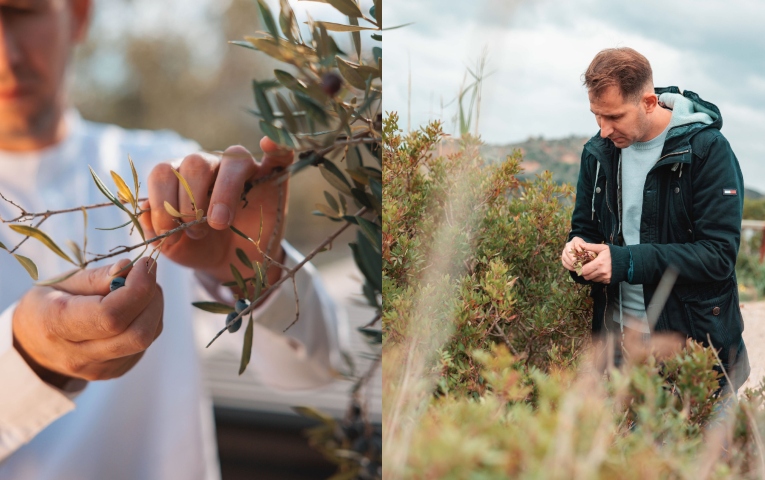
Do you enjoy plant-based cuisine?
I love vegetables – cooking and eating them. I think preparing a vegetable is often harder than cooking meat or fish. There are restaurants like Alain Parssard’s L’Arpège in Paris, with three Michelin stars, that focus almost entirely on vegetables. And let’s not forget that Greek cuisine, and Messinian food, is largely plant-based. “Horiatiki,” the classic Greek salad, is among the 5 best vegetarian dishes in the world, in my opinion.
Honoring cultural food traditions is important to you. How will you do that at W Costa Navarino?
I think we chefs at the destination can become messengers, telling guests stories of Messinia. When they sit down for breakfast with a dish like “galatopita” (milk pie), that will create a memory for them of this place, which honors the culture of the region.
We’ll use local products whenever possible. You’ll still be able to order a club sandwich on the beach, but it will be made with local ingredients. We’ll be playful too – this is a W Escape, after all. One dish that I’m excited about is a bowl that pairs tzatziki with Lebanese tabbouleh.
Which local ingredients would you like to highlight?
We’re just an hour away from Kalamata, so olives and olive oil, of course. We also have some of the best figs in the world here. Then there’s the “hontrokatsari” tomato, or beef heart tomato, which isn’t pretty to look at, but delicious. “Lalagia” (fried dough ribbons) will be served at breakfast and used in a salad.
Do you still love the smell of bread?
I’m crazy for it! The breakfast concept at W Costa Navarino [consisting of a coffee shop, a deli, a live cooking station, and a bakery] is perfect for me. There we bake a variety of fresh sourdough breads every day. I find it amazing how we can mix just four ingredients: water, flour, sourdough starter and salt, and create miraculous things. I would probably have become a baker, had it not been for the early mornings!
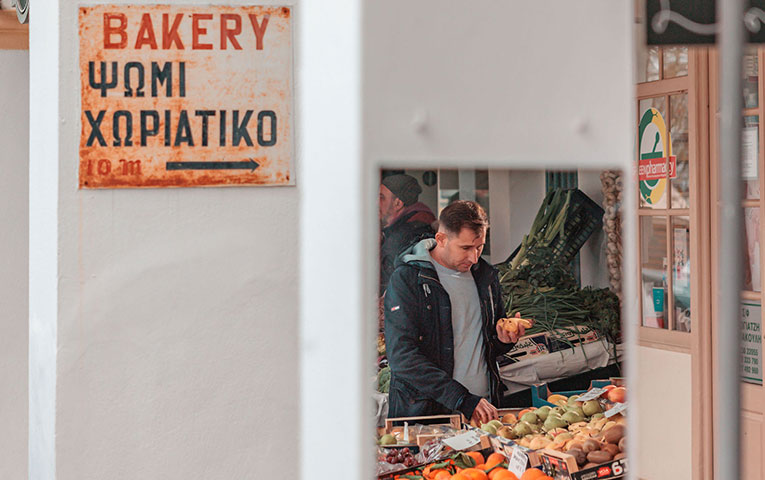
You travel extensively around Europe and have spent the last decade cooking food with Italian influences at Botrini’s. What inspires you more – new experiences or the food you grew up with?
I think travel is the best thing you can spend your money on, and it inspires me in every aspect of life. Unfortunately, while I travel often, I can’t step away from the kitchen long enough to go far – like to Japan, which is high on my list. But I’ve visited many countries in Europe and worked in restaurants in ten of them. One recent trip that inspired me was to Izmir, where I explored incredible marketplaces.
Visiting the markets is a thing I love to do when traveling. It’s a great way to get to know a place. If someone wants to explore Kalamata, for instance, the weekly Saturday market is a must. There, you’ll see what seafood is available, you’ll find cured meats like local “siglino,” and produce that will tell you what’s currently in season.
So, what’s the verdict – is Greek food your favorite?
My favorite is good cuisine, tasty cuisine, no matter where it’s from. Living in Greece and having grown up here, I love Greek food, and that’s what I want to promote. But I’m also inspired by other traditions.
The globalization of food and flavors is both a blessing and a challenge. On the one hand, we get interpretations of classic dishes that don’t always do them justice. On the other, we’re exposed to new flavors, new ideas, and endless inspiration. Five years ago, if you went to a bakery here and asked for a Swedish “semla,” no one would know what that was. Now? It’s something I’d love to serve for breakfast at W. What is your favorite Greek food?
Me? Hm. Maybe fasolakia. What’s yours?
Anything with eggplant.
A summer vegetable! Or do you cook it in winter too?
You know, seasons are changing. I’ve been in Messinia for a month now, and it feels like spring, not winter. Thirty years ago, you wouldn’t have cooked eggplant in Greece in February, but now it’s available, and I’ve had some really good winter eggplants. Just last weekend in Athens, I stopped by the farmers’ market in Exarchia, and it was full of strawberries – in the middle of winter! See? Everything evolves.
So, it’s true that every cuisine is tied to a place, the ingredients of that place, traditions and the people who bring it to life. But in the end, my favorite cuisine is good cuisine. To me, that’s the only distinction that needs to be made.
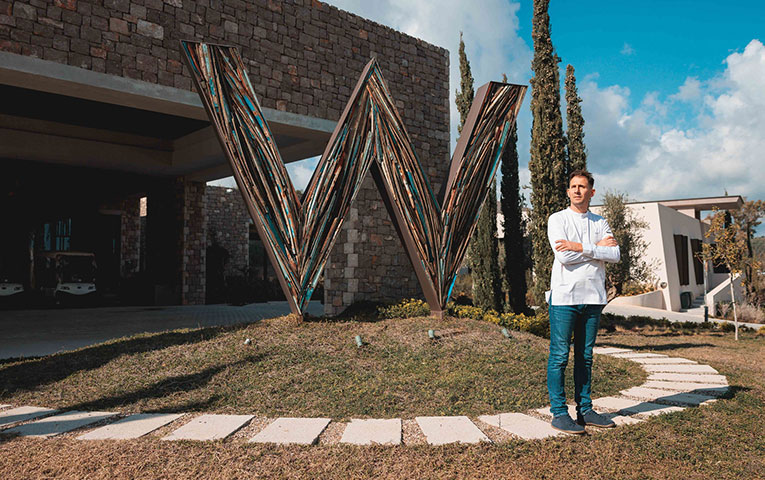
Under Chef Nikos Billi’s guidance, W Costa Navarino’s dining scene is set for a refresh in 2025. The Ethnic Listening Bar at W Lounge blends global cuisine with curated vinyl sets and live jazz. Platia Flavors celebrates Greece’s culinary heritage with an artisanal bakery, traditional street food, and taverna-style dining. Parelia, the heart of W Costa Navarino’s beachfront experience, serves grilled seafood, premium meats, and mezze, before transforming into a vibrant evening destination with wood-fired cooking, inventive cocktails, and DJ beats. Green Pepper champions healthy dining and creative brunches, while Piqantro Iberica, located in Navarino Hills, offers a Spanish-Mediterranean twist, serving expertly crafted meat dishes.
